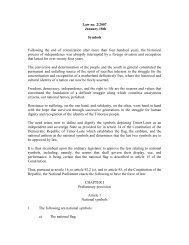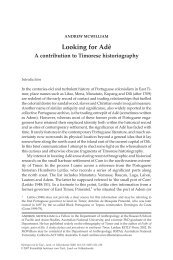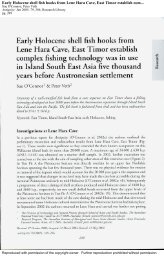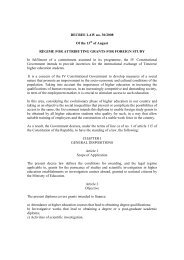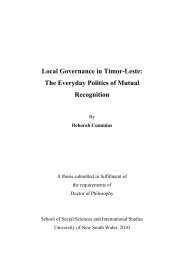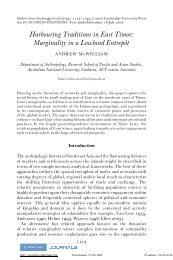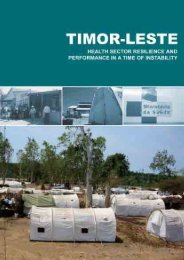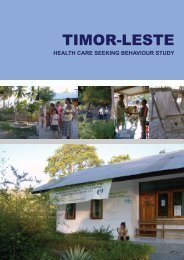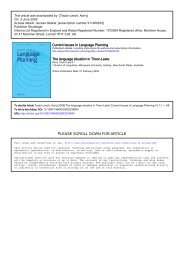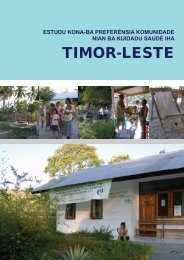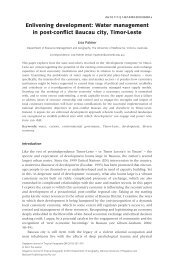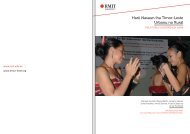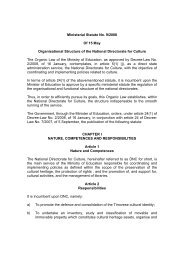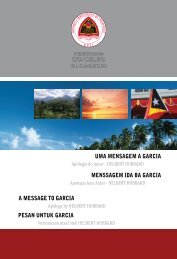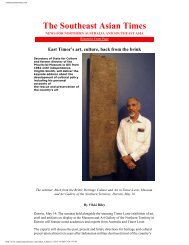The Naueti relationship terminology - Secretaria de Estado da Arte e ...
The Naueti relationship terminology - Secretaria de Estado da Arte e ...
The Naueti relationship terminology - Secretaria de Estado da Arte e ...
You also want an ePaper? Increase the reach of your titles
YUMPU automatically turns print PDFs into web optimized ePapers that Google loves.
246<br />
David Hicks<br />
dialects was influenced by these non-Austronesian languages. Of the four<br />
dialects, Waimaha, Kairui, and Midiki display the most intimate linguistic<br />
connections, <strong>Naueti</strong> being sufficiently distant to warrant speculation that it<br />
might actually be more appropriately classed as a language in its own right<br />
rather than as a mere dialect.<br />
<strong>Naueti</strong> subsistence is based on the cultivation of rice (both irrigated and<br />
dry), maize, greens, legumes, and root crops, as well as animal husbandry that<br />
inclu<strong>de</strong>s the raising of goats, pigs, chickens, buffaloes, and horses. Prior to the<br />
Indonesian army’s disruption of their settlement pattern, a group of agnatically<br />
related males and their unmarried sisters formed the resi<strong>de</strong>ntial core of<br />
houses, a localized group known as the baha, a term also <strong>de</strong>noting ‘hamlet’,<br />
the basic unit of the social organization. <strong>The</strong>se baha are components of a larger<br />
entity called the wari-kaka, which are <strong>de</strong>scent groups of variable segmentary<br />
character that may be appropriately glossed as ‘patrilineage’, or ‘patrilineal<br />
subclan’, or ‘patrilineal house’ (in the more inclusive sense of <strong>de</strong>scent group<br />
segment). <strong>The</strong> term itself is a compound <strong>de</strong>signation in which wari means<br />
‘younger’, ‘younger agnate of ego’s genealogical level’ and kaka means ‘el<strong>de</strong>r’,<br />
‘el<strong>de</strong>r agnate of ego’s genealogical level’. It <strong>de</strong>notes both sexes. 17 Agnates may<br />
also be called by a term of even wi<strong>de</strong>r application, ba<strong>da</strong>, 18 which inclu<strong>de</strong>s affines,<br />
and used in a more precise sense may <strong>de</strong>note ‘husband’. Hamlets were<br />
formerly scattered throughout <strong>Naueti</strong> territory, but un<strong>de</strong>r the Indonesian<br />
occupation, which began in December 1975, were abandoned when the military<br />
forces congregated hamlet resi<strong>de</strong>nts into encampments adjacent to roads<br />
where they could more conveniently be supervised. With the attainment of<br />
East Timor’s in<strong>de</strong>pen<strong>de</strong>nce in May 2002, however, hamlet dwellers, more<br />
especially ol<strong>de</strong>r ones, began returning to their abandoned ancestral lands to<br />
reclaim the patrimony of their <strong>de</strong>scent groups.<br />
To<strong>da</strong>y, as before the occupation, <strong>Naueti</strong> a<strong>da</strong>t 19 enjoins that upon the <strong>de</strong>ath<br />
of their owner land, crops, livestock, and other such items of wealth as a man<br />
may have accumulated during the course of his lifetime accrue in the main to<br />
his male <strong>de</strong>scen<strong>da</strong>nts. Political office, including that of traditional chief of the<br />
suku, a lea<strong>de</strong>r known as the liurai, also <strong>de</strong>volves upon men agnatically related<br />
to distant ancestors, and the inheritance of such rights (together with their<br />
concomitant duties) as family name, <strong>de</strong>scent group membership, and totemic<br />
observances pass down the male line. This patrilineal mo<strong>de</strong> of reckoning<br />
<strong>de</strong>scent is reinforced by a patrilocal post-marital resi<strong>de</strong>nce for a husband, a<br />
right that is secured by the giving of bri<strong>de</strong>wealth.<br />
17 <strong>The</strong> term corresponds to the wi<strong>de</strong>spread and more commonly known Tetum category alimaun.<br />
18 It is the <strong>Naueti</strong> equivalent of the Tetum term maluk.<br />
19 This Malay term was not used in pre-Indonesian times to any wi<strong>de</strong>spread extent. Nowa<strong>da</strong>ys<br />
it is common currency.



